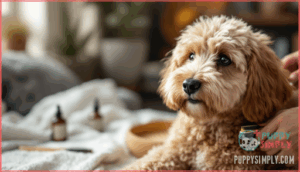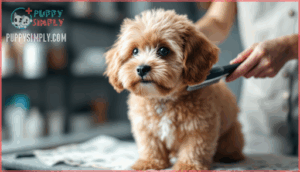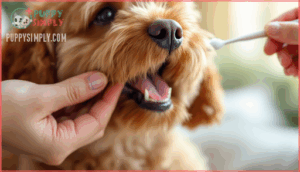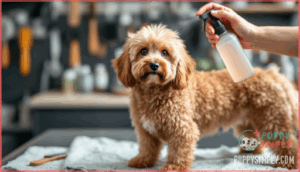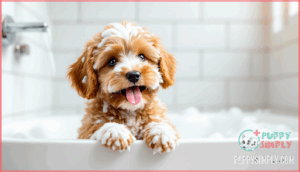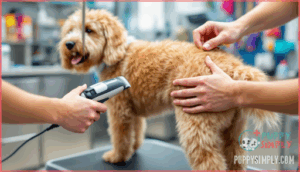This site is supported by our readers. We may earn a commission, at no cost to you, if you purchase through links.

The good news is that most odor problems are fixable once you pinpoint the source, and your pup can go back to being the sweet-smelling companion you signed up for.
Table Of Contents
- Key Takeaways
- Causes of Cockapoo Odor
- Preventing Cockapoo Odor
- Bathing a Cockapoo Puppy
- Full Groom for Deodorizing
- Maintaining Fresh Breath and Clean Ears
- Cockapoo Deodorizing Tip: Don’t Forget The Bedding
- Cockapoo Deodorizing Tip: Try Scented Dog Products
- Cockapoo Deodorizing Tip: Regular Bathing
- Cockapoo Deodorizing Tip: Quick Trim
- Frequently Asked Questions (FAQs)
- Why is my Cockapoo smelly?
- How to keep a cockapoo smell-free?
- Do Cockapoos stink?
- Why does my Cockapoo have bad breath?
- Why do dog owners choose Cockapoos?
- Is a cockapoo an offensive dog odor?
- Are there any specific types of shampoos or conditioners that are recommended for Cockapoos?
- How often should a Cockapoo be bathed?
- How can I prevent my Cockapoo from rolling in stinky things?
- How often should I feed my Cockapoo?
- Conclusion
Key Takeaways
- Cockapoos don’t naturally smell bad, but when they do, it’s usually caused by specific fixable issues like impacted anal glands (creating a fishy odor), ear infections, dental problems, or skin conditions that trap bacteria in their coat.
- Prevention requires consistent grooming every 4-6 weeks, regular brushing 4-5 times weekly, proper bathing every 3-4 weeks, and maintaining clean bedding that absorbs oils and odors from your freshly groomed dog.
- Two commonly overlooked odor sources are the mouth and ears—brush your Cockapoo’s teeth 2-3 times weekly to prevent tartar buildup and clean their floppy ears weekly since trapped moisture creates bacterial growth.
- Quick sanitary trims around the rear end, genital area, and paw pads prevent urine, feces, and moisture from collecting in the fur, which significantly reduces odor-causing bacteria between full grooming sessions.
Causes of Cockapoo Odor
If your Cockapoo smells bad, you’re not imagining it—and you’re definitely not alone. Several health issues can turn your sweet pup into a walking stink bomb. Let’s look at two common culprits that often fly under the radar.
Anal Gland Problems
If your Cockapoo smells like a fish market on a hot day, there’s a good chance those two tiny anal glands are to blame. These glands normally empty during bowel movements, but when they don’t, things get messy—and smelly.
Impaction Symptoms to watch for:
- Scooting or dragging their rear across the floor
- Excessive licking around the tail area
- Difficulty sitting or signs of discomfort
- A strong fishy odor that won’t go away
- Visible swelling or redness near the anus
Expression techniques performed by your vet or groomer can provide quick relief. Dietary impact matters too—adding fiber helps promote natural emptying. Infection risks increase with chronic impaction, sometimes requiring surgical options.
Don’t ignore these dog health issues; proper veterinary care and dog odor control strategies will keep your pup comfortable.
Medical Conditions
Beyond anal glands, other dog health issues can make your Cockapoo smell off. Ear infections cause a yeasty, musty odor that’s hard to miss. Skin allergies lead to excessive scratching and bacterial buildup on the coat. Tooth decay creates bad breath that permeates their fur. Even kidney disease or UTIs can produce a urine-like smell. These Cockapoo health problems need veterinary attention—your nose is telling you something’s wrong.
Regular grooming is essential to prevent Cockapoo odour issues.
Preventing Cockapoo Odor
The good news? Dog Odor Control and Prevention starts with you taking charge of Cockapoo care and grooming before problems get out of paw-sibility. Early detection makes all the difference—catching issues at their first whiff means you won’t be wrestling with a full-blown stink situation later.
Here’s your game plan for Odor Control:
- Stick to a grooming schedule: Professional grooming every 4–6 weeks plus regular brushing (at least 4–5 times weekly) keeps Environmental Factors like dirt and debris from settling into your pup’s coat.
- Mind the Dietary Influence: A balanced diet encourages healthy skin and reduces smelly coat issues, while proper Hydration Importance can’t be overlooked—well-hydrated dogs usually have healthier skin.
- Keep everything clean: Pet hygiene and cleaning extends beyond your dog to their bedding, bowls, and living spaces.
Regular Exercise Impact also plays a role in overall health, which naturally encourages better odor management. To avoid matting and tangling, daily brushing is highly recommended. Following these dog grooming tips consistently means you’ll spend less time holding your breath around your beloved Cockapoo.
Bathing a Cockapoo Puppy
When you’ve got your grooming routine locked down, the next step is making sure bath time actually does its job—and that starts with knowing how to wash your Cockapoo puppy the right way. Choose a puppy shampoo designed for sensitive skin, since harsh products can dry out their coat and make odor worse. Place your pup in a sink or tub with warm water, lather gently, and rinse thoroughly—leftover shampoo residue invites bacteria.
Drying techniques matter, too. Towel-dry completely, then use a low-heat blow dryer if your Cockapoo tolerates it. Bathing frequency should be every 3–4 weeks unless they’ve rolled in something nasty.
Use positive reinforcement throughout—treats and calm praise make dog grooming less stressful. But bathing alone won’t cut it if deeper grooming issues lurk beneath the surface.
Full Groom for Deodorizing
A thorough brush-out eliminates stubborn smells that bathing alone can’t touch, especially when dirt, debris, or trapped moisture are hiding deep in your Cockapoo’s coat. Use proper brushing techniques with a slicker brush to detangle mats and remove dead hair—these trap odor-causing bacteria. Follow up with a metal comb to catch anything you missed.
If you’re not confident managing pet hygiene yourself, professional groomers can perform a full deodorizing session every 6–8 weeks. Between visits, stick to a grooming frequency that keeps your Cockapoo’s coat clean without over-bathing, which strips natural oils.
But even the best dog grooming routine won’t help if dental issues or ear problems are creating the smell.
Maintaining Fresh Breath and Clean Ears
Beyond a good bath, two often-overlooked areas can make or break your Cockapoo’s freshness: their mouth and ears. These spots are prime real estate for bacteria and odor-causing buildup if you’re not keeping tabs on them.
Let’s tackle both so your pup smells sweet from nose to tail.
Tooth-Brushing Time
Bad breath in your Cockapoo isn’t just unpleasant—it’s often your first warning sign that something’s brewing beneath the surface. Poor dental hygiene leads to tartar buildup, gum disease, and that distinctive smelly breath you can’t ignore.
Here’s how to tackle it:
- Use dog-specific toothpaste and a soft-bristled brush designed for dogs
- Brush at least 2-3 times weekly for effective tartar control
- Focus on the gum line where bacteria accumulate most
- Start slowly if your dog’s new to brushing techniques
Regular brushing isn’t just about breath freshness—it’s essential preventive care for your dog’s overall health.
Check Those Ears
Those floppy Cockapoo ears aren’t just adorable—they’re also a magnet for moisture, wax, and bacteria that can turn into a smelly problem faster than you’d think. Ear cleaning should happen weekly using vet-approved solutions—never hydrogen peroxide or alcohol, which irritate sensitive skin.
| What to Check | Warning Signs |
|---|---|
| Odor | Strong, yeasty, or musty smell |
| Discharge | Dark, crusty buildup or yellow/green fluid |
| Behavior | Head shaking, scratching, tilting |
Gently wipe the outer ear with a cotton ball dampened in vet solutions—don’t probe deep into the canal. Excess hair plucking by your groomer helps prevent buildup and improves airflow. Catching infection signs early saves your Cockapoo from painful ear infections and keeps pet hygiene on track.
Cockapoo Deodorizing Tip: Don’t Forget The Bedding
Your Cockapoo’s bed can soak up oils, dirt, and odors like a sponge—and all that funk transfers right back to your freshly bathed pup. Wash your dog’s bedding at least once a week to control pet odor and keep things fresh. Hot water helps with allergen removal and breaks down oils that cause dog odor.
Choose washable fabric options over foam beds that trap smells and can’t be cleaned easily. If you’re battling stubborn Cockapoo smell, consider bedding alternatives like elevated cots or blankets you can swap out daily. Think of it as hitting reset on odor absorption—your dog spends hours there, so clean bedding isn’t optional for real dog smell solutions. It’s one of the simplest odor control moves you can make.
Cockapoo Deodorizing Tip: Try Scented Dog Products
Between baths, scented dog products can work like a quick refresh button for your Cockapoo’s coat. Dog-safe sprays with ingredients like aloe vera, chamomile, or lavender can mask dog odor while moisturizing skin. But here’s the catch—not all products are created equal.
Three quick scent options for odor control:
- Dog deodorant spray – Apply between washes for instant freshness and Cockapoo hygiene maintenance
- Apple cider vinegar mist – Mix equal parts water and vinegar as a natural scent alternative that balances skin pH
- Baking soda dusting – Sprinkle on the coat, wait a few minutes, then brush out to absorb stubborn dog smell
Check product ingredient research before using anything on your pup. Watch for fragrance allergy concerns like itching or redness.
Dog shampoo scent duration only lasts so long, so these quick fixes help maintain freshness. Just remember—scented spray safety matters, so skip human perfumes and stick with vet-approved options.
Cockapoo Deodorizing Tip: Regular Bathing
Regular bathing works like hitting reset on your Cockapoo’s smell—it washes away the grime, bacteria, and oils that build up over time. Aim for bathing every two to four weeks, depending on how dirty your pup gets. This bathing frequency keeps dog smell under control without stripping natural oils from sensitive skin.
Before you start, brush out any mats or tangles. Use a Cockapoo shampoo designed specifically for dogs—human products throw off their skin’s pH balance and can cause irritation. Work the shampoo into a good lather, then rinse thoroughly. Leftover residue attracts dirt and creates that funky smell you’re trying to avoid.
Drying techniques matter too. Towel off excess water, then let your dog air dry in a warm spot. If you’re using a blow dryer, keep it on low heat and moving constantly. For tricky dog grooming situations or dogs with particularly sensitive skin, professional groomers can take care of the whole process safely.
Cockapoo Deodorizing Tip: Quick Trim
A little strategic trimming in the right spots can stop odor before it even starts. Focus on sanitary clip areas—the fur around your Cockapoo’s rear end and genital area. These spots trap urine, feces, and moisture, creating a perfect breeding ground for bacteria and that signature wet dog smell.
Use blunt-tip scissors or electric clippers with a guard to avoid nicking sensitive skin. Trim just enough to keep things tidy—you don’t need to shave down to the skin. This simple trimming technique delivers major hygiene benefits and makes cleanup after bathroom breaks much easier.
Check the paws too. Matted fur between the pads collects dirt and moisture, adding to overall odor. A quick trim every few weeks keeps these problem areas clean and greatly improves odor prevention. If you’re nervous about doing a genital haircut yourself, any groomer can address this basic Cockapoo care task during regular dog grooming appointments. It’s one of the easiest dog grooming tips that makes a real difference.
Frequently Asked Questions (FAQs)
Why is my Cockapoo smelly?
Ever notice how even the cleanest pup can suddenly clear a room? Cockapoo smell usually comes from dirty coats, ear infections, dental problems, anal gland issues, or diet-related flatulence—all fixable with proper canine hygiene and regular grooming.
How to keep a cockapoo smell-free?
Keep things fresh with consistent grooming routines, balanced dietary influence, proper hydration, regular exercise, and mental wellbeing support.
Breed specifics matter—combine dog shampoo and grooming products with canine hygiene practices for effective dog smell solutions and overall dog odor control.
Do Cockapoos stink?
No—Cockapoos don’t naturally stink like some breeds do. Their poodle heritage gives them low-odor coats, but individual variation matters.
When smells arise, they’re usually fixable through proper hygiene, diet adjustments, or addressing underlying health issues.
Why does my Cockapoo have bad breath?
Bad breath in Cockapoos usually stems from poor dental hygiene, leading to gum disease or tooth decay. Diet impact matters too—low-quality food can worsen dog odor. Regular vet checkups and breath sprays help maintain dog health.
Why do dog owners choose Cockapoos?
Many families love that this Poodle mix blends hypoallergenic qualities with a friendly temperament. These low-shedding, allergy-friendly breeds offer ideal size, manageable grooming needs, and the perfect family companion personality.
Is a cockapoo an offensive dog odor?
Cockapoos aren’t naturally offensive-smelling dogs. Their poodle heritage gives them low-odor coats compared to other breeds.
However, hygiene standards, diet impact, and environmental factors play major roles in canine odor control. Poor dog hygiene or underlying health issues can make any Cockapoo smell unpleasant.
Are there any specific types of shampoos or conditioners that are recommended for Cockapoos?
Like finding the perfect tonic for your Victorian gentleman’s hair, choosing the right dog shampoo matters. Look for gentle, pH-balanced, hypoallergenic shampoos designed for Cockapoos’ sensitive skin.
Oatmeal pet shampoo works beautifully for soothing irritation, while puppy formulas offer extra mildness.
Don’t forget detangling sprays—they’re game-changers for those curly coats during dog grooming sessions.
How often should a Cockapoo be bathed?
Most Cockapoos need a bath every 4-6 weeks, depending on their activity level and coat condition. Bathe your dog when they’re visibly dirty or smelly, but don’t overdo it—excessive bathing strips natural oils and can actually worsen dog odor.
Between baths, regular brushing keeps their coat fresh.
How can I prevent my Cockapoo from rolling in stinky things?
You don’t want your freshly bathed pup diving into something foul minutes later, right? Training recall and leash manners help you redirect your Cockapoo before they roll in stinky substances during muddy walks.
Supervise playtime, use distraction techniques like toys, and maintain environmental awareness outdoors.
How often should I feed my Cockapoo?
Most Cockapoos do well on two meals daily—puppies need three to four smaller portions.
Adult portions depend on your dog’s size, activity level, and the food’s calorie density, so check your kibble’s feeding guidelines and adjust based on body condition.
Conclusion
Your nose doesn’t lie—if you’re wondering why your Cockapoo smells so bad, it’s time to channel your inner detective and follow the stench to its source. Whether it’s a quick ear cleaning, a dental tune-up, or a professional groom, most odor problems are easier to fix than you think.
Don’t let your pup become the family member everyone avoids on the couch—stay consistent with grooming, keep an eye on health red flags, and your Cockapoo will smell as good as they look.
- https://www.petmd.com/dog/grooming/evr_dg_shampoo_for_dogs
- https://www.akc.org/expert-advice/lifestyle/best-dog-beds-choose-comfiest-bed-pup/
- https://tidd.ly/3vJZgSN
- https://www.groomers-online.com/how-to-groom-a-cockapoo-i396
- https://tuftapp.com/5-things-to-know-before-taking-a-cockapoo-to-the-groomers/

